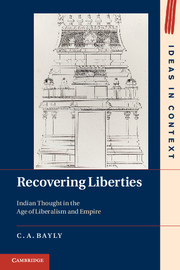Book contents
- Frontmatter
- Contents
- Preface
- Note on Indian names
- Introduction
- Chapter 1 The social and intellectual contexts of early Indian liberalism, c.1780–1840
- Chapter 2 The advent of liberalism in India
- Chapter 3 The advent of liberal thought in India and beyond
- Chapter 4 After Rammohan
- Chapter 5 Living as liberals
- Chapter 6 Thinking as liberals
- Chapter 7 Giants with feet of clay
- Chapter 8 Liberals in the Desh
- Chapter 9 ‘Communitarianism’
- Chapter 10 Inter-war
- Chapter 11 Anti-liberalism, ‘counter-liberalism’ and liberalism’s survival, 1920–1950
- Conclusion
- Glossary
- Select bibliography
- Index
- References
Chapter 8 - Liberals in the Desh
north Indian Hindus and the Muslim dilemma
Published online by Cambridge University Press: 05 June 2012
- Frontmatter
- Contents
- Preface
- Note on Indian names
- Introduction
- Chapter 1 The social and intellectual contexts of early Indian liberalism, c.1780–1840
- Chapter 2 The advent of liberalism in India
- Chapter 3 The advent of liberal thought in India and beyond
- Chapter 4 After Rammohan
- Chapter 5 Living as liberals
- Chapter 6 Thinking as liberals
- Chapter 7 Giants with feet of clay
- Chapter 8 Liberals in the Desh
- Chapter 9 ‘Communitarianism’
- Chapter 10 Inter-war
- Chapter 11 Anti-liberalism, ‘counter-liberalism’ and liberalism’s survival, 1920–1950
- Conclusion
- Glossary
- Select bibliography
- Index
- References
Summary
A central argument of this study is that we need to retain space for the creative role of liberal ideas in social and political change. Yet one of the conditions for the emergence of a consensus avowedly directed towards ameliorative change was surely the existence of a significant body of opinion, a clustering of institutions and an acceptance of discourses, which empowered new social mores, educational philanthropy or pressures for representative government. The situation was different in contexts where liberal or self-styled progressive activists were thin on the ground, whether it was in Giuseppe di Lampedusa’s imagined Sicily during the age of Garibaldi, or the north Indian plains in the days of the taluqdars (great landholders) of Awadh, dominated by a conservative officialdom stunned by the events of 1857–9. This chapter therefore turns mainly to liberalism ‘up country’ in the North-western Provinces and Punjab during the later nineteenth century. Here the railway, colonial education and the press had begun to effect changes, but only very lately and in confined spaces. The chapter concludes with a discussion of the dilemmas of India’s Muslim liberals.
Recent scholarship has often been critical of the small modern elites of these regions, considering writers, such as Harish Chandra of Benares, or politicians, such as Madan Mohan Malaviya, as ambivalent nationalists at best, as clients of urban propertied families, or even full-blooded ‘communalists’. Undoubtedly, the patronage of nawab, raja or rais (magnate) provided an inescapable context for the thought and social activity of these publicists. But, equally, their very obvious marginality and dependence created the spur to a significant degree of radicalism. This was the position adopted, for instance, by Lakshmi Sagar Varshneya, the major Hindi writer and literary critic of the 1940s and 1950s, who described Harish Chandra and his followers as ‘the vanguard of modernism’ and Hindi as modern. What did he mean by this?
- Type
- Chapter
- Information
- Recovering LibertiesIndian Thought in the Age of Liberalism and Empire, pp. 214 - 244Publisher: Cambridge University PressPrint publication year: 2011



